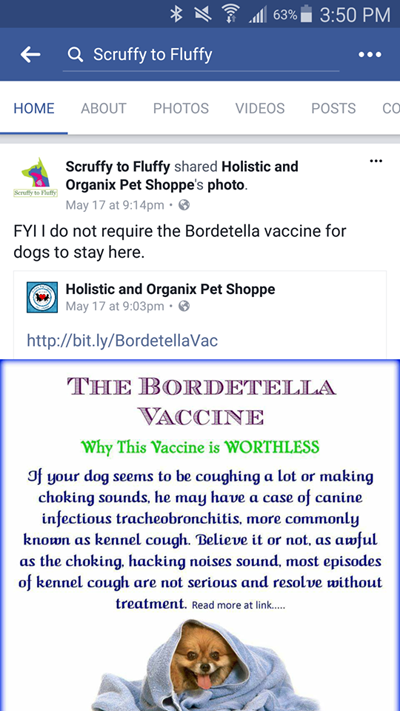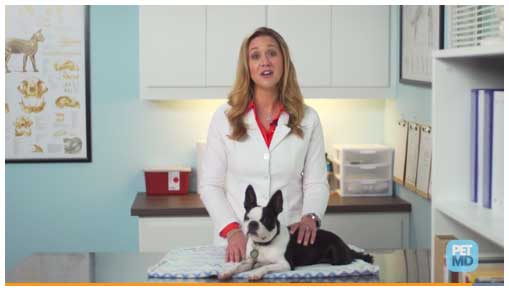Some holistic businesses are claiming that Bordetella, a highly infectious canine disease that is also contagious to humans is “not serious” and that you should not “over-vaccinate” your dog. I researched on the internet and there are some anti vaxers claiming it is not necessary to vaccinate your dogs. In a kennel or grooming setting tho it is imperative. Why? For the idealistic premise of holistic vaccination to work, your dog must not have any exposure to any other dogs at all. There has to be a common sense approach to protecting your pets. These diseases actually do exist, and herbs, diet plans and vitamins won’t have an impact on most of them. As of this writing, I have been sick for more than two weeks now with that vile so-called “Summer Cold” that’s been going around, and nothing short of two doctor’s visits were able to make a dent in it. I am still coughing mucus–don’t make this mistake and let someone tell you your pet doesn’t need their shots.
 First let’s start with clarifying what Holistic Medicine is and is not. First of all, we here at Snug At Home DO believe in Holistic remedies for various pet behaviors and conditions. But again, with no intentions of offending those who work solely in Holistic Medicine, what we work with is more within the realm of animal medicine and common sense. Holistic medicine is a form of healing that considers the whole person — body, mind, spirit, and emotions — in the quest for optimal health and wellness. Holistic medicine is a term used to describe therapies that attempt to treat the patient as a whole person. That is, instead of treating an illness, as in orthodox allopathy, holistic medicine looks at an individual’s overall physical, mental, spiritual, and emotional wellbeing before recommending treatment. Vitamin supplements, diet, aromatherapy, even good old fashioned catnip or specialized dog treats can help relieve arthritis and other joint pain, soothe a troubled pet or alleviate stress and other behaviors, but when it comes to preventing or treating viral and other contagious illnesses and diseases, you have many other factors to consider.
First let’s start with clarifying what Holistic Medicine is and is not. First of all, we here at Snug At Home DO believe in Holistic remedies for various pet behaviors and conditions. But again, with no intentions of offending those who work solely in Holistic Medicine, what we work with is more within the realm of animal medicine and common sense. Holistic medicine is a form of healing that considers the whole person — body, mind, spirit, and emotions — in the quest for optimal health and wellness. Holistic medicine is a term used to describe therapies that attempt to treat the patient as a whole person. That is, instead of treating an illness, as in orthodox allopathy, holistic medicine looks at an individual’s overall physical, mental, spiritual, and emotional wellbeing before recommending treatment. Vitamin supplements, diet, aromatherapy, even good old fashioned catnip or specialized dog treats can help relieve arthritis and other joint pain, soothe a troubled pet or alleviate stress and other behaviors, but when it comes to preventing or treating viral and other contagious illnesses and diseases, you have many other factors to consider.
Holistic medicine will not prevent nor cure Kennel Cough, Distemper, Rabies, Cancer, Feline Immunodeficiency Virus (FIV), Feline Leukemia Virus (FelV), Heartworms, Ringworm.
Some sites even go so far as to downplay and complain about Rabies vaccines. You absolutely have to fact-check all data on these practices, even though these days there is an overwhelming gorge of false and erroneous information.
“While conventional vets would call side effects uncommon, many holistic veterinarians believe that vaccinations can have significant long-term effects on your dog. If you are like most dog owners, you have probably heard about vaccinating your dog so many times that you are afraid to not use them. Rabies vaccines are even required by law, for crying out loud! Rabies vaccines for dogs are usually required to protect humans, so even though many holistic vets feel that they can be harmful, you may not have a choice depending on local laws.”
“Rabies vaccines for dogs are usually required to protect humans”…?? But what about my dog??? Why tell me not to vaccinate my dog and let me put them in harm’s way around other unprotected dogs? What if they got loose and were bitten by a wild animal with rabies?? Just like interstate driving…you know it’s always the other guy you gotta watch out for.
Kennel Cough in Dogs
–Dr. Katy Nelson, PetMD Veterinary Expert
Infectious Canine Tracheobronchitis
Kennel cough, the common name given to infectious canine tracheobronchitis, is a highly contagious respiratory disease among dogs. As the name suggests, it is typified by inflammation of the trachea and bronchi. This disease is found throughout the world and is known to infect a high percentage of dogs at least once during their lifetime. It is also sometimes referred to as bordetellosis.
Young puppies often suffer the most severe complications that can result from this disease since they have immature immune systems. Also at increased risk are older dogs, who may have decreased immune capabilities, pregnant bitches, who also have lowered immunity, and dogs with preexisting respiratory diseases.
SYMPTOMS
- A persistent cough is the most common symptom
- Retching
- Watery nasal discharge
- In mild cases, dogs are often active and eating normally
- In severe cases, symptoms progress and can include pneumonia, inappetence, fever, lethargy and even death
CAUSES
Some of the most common microorganisms that contribute to infectious canine tracheobronchitis are Bordetella bronchiseptica bacteria, canine adenovirus, parainfluenza virus, and mycoplasma. Any of these organisms can cause the symptoms of this disease, alone or in combination. Infections with multiple organisms tend to cause the most severe symptoms.
Dogs often develop clinical signs associated with kennel cough 3-4 days after exposure to a large number of other dogs (e.g., at a boarding facility or show).
DIAGNOSIS
The diagnosis of this disease is largely based upon the type of symptoms that are present and a dog’s history with regards to exposure to other dogs. You will need to give a thorough history of your dog’s health and onset of clinical signs. Your veterinarian may order some combination of blood chemistry tests, a complete blood cell count, a urinalysis, fecal examinations, and chest X-rays. If a dog does not respond to treatment as expected, additional testing (e.g., bacterial cultures) may be necessary to identify the microorganisms that are causing kennel cough.
TREATMENT
Treatment depends on the severity of the infection. If your dog is alert, active, eating well, and has only minor symptoms, your veterinarian may only prescribe general supportive care like rest and good hydration and nutrition. More severely affected dogs benefit from medications that reduce inflammation and coughing. If a bacterial infection is present, antibiotics may help shorten the course of the disease. Dogs with pneumonia often need to be hospitalized for more aggressive treatment.
LIVING AND MANAGEMENT
In order to prevent the spread of this disease, dogs with kennel cough should be isolated until they are better and no longer contagious. Dogs who are at high risk for infection (e.g., those who attend shows or spend time in boarding or day care facilities) should be vaccinated against Bordetella bronchiseptica and canine parainfluenza virus. All dogs should be vaccinated against canine adenovirus.
 Even after being vaccinated, dogs may still acquire kennel cough (although usually a less severe form than they would have otherwise). It is best to be observant and prepared.
Even after being vaccinated, dogs may still acquire kennel cough (although usually a less severe form than they would have otherwise). It is best to be observant and prepared.
Although this infection usually does not cross over to humans, there are instances where young children and adults with compromised immune systems may be at risk. In these instances, it is best to talk to your veterinarian and human health care provider about your options.
* * *
Despite claims of “do not over-vaccinate your dog” the facts are plain. Should you vaccinate your dog against Bordetella/Kennel Cough? PetMD says yes. Keep yourself and your pets safe. Stay informed. Remember, your pets depend on you.






